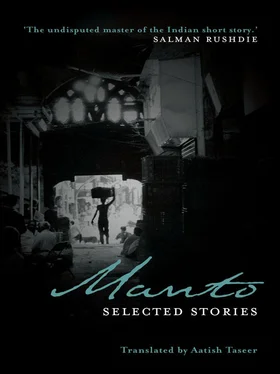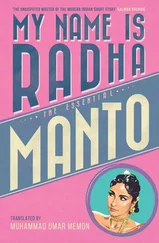I wondered whether Kamal, the panditani, would spend her time in the ashram singing patriotic and devotional songs for Babaji. I had met some of the ashram’s male volunteers. The whole lot of them, according to the rules of the place, rose early, bathed, brushed their teeth, lived in the open, sang devotional songs, but their clothes reeked of sweat, often their breath was bad and that colour and vigour that comes to men when they live in the outdoors was entirely absent in them.
Stooped, subdued, sallow, sunken-eyed and weakbodied, like some cow’s deflated udders, lifeless and inert, yes, I’d seen the ashram’s men often in Jallianwala Bagh. But now I wondered, would the murky eyes of these same men who stank somehow of stale grass ogle this panditani made of milk, honey and saffron? Would these same men, with their foul-smelling breath, make conversation with this fragranced creature? Then I checked myself, India’s independence was more important than these considerations; maybe.
For all my love of my country and my passion for independence, I couldn’t quite comprehend this ‘maybe’ because at that moment I thought of Nigar, sitting next to me, telling Babaji that turnips take a long time to soften. Where were turnips and where was the marriage that she and Ghulam Ali had come to seek permission for!
I began to think of Nigar in the ashram. I hadn’t seen it myself, but I have always — I’m not sure why — felt a hatred for these places that go by the names of ashrams, shelters, seminaries and retreats. I have on many occasions seen the students and administrators of these shelters for the blind and orphaned, walking the streets in a column, begging for money. I have seen seminaries and madrasas with boys in shortened religious pyjamas, their foreheads calloused from prayer, in childhood; the older ones, with their thick, black beards; the younger, with that truly repugnant combination of thick and fine hair on their cheeks and chins. They carry on piously reading their prayers, but in each of their eyes, animal passions are clearly visible.
Nigar was a woman, not a Muslim, Hindu or Christian woman, just a woman; no, she was more than that, she was like a prayer incarnate of her love for Ghulam Ali. A woman like this had no need to raise her hands in prayer at Babaji’s ashram, where daily prayer was a regulation.
When I look back now, Babaji, Nigar, Ghulam Ali, the beautiful panditani and Amritsar’s entire atmosphere at that time, infused with the romance of the independence movement, appear to me like a dream, a dream which, once dreamt, begs to be dreamt again. And though I still haven’t seen Babaji’s ashram, the antipathy I possessed for it then, I still possess now.
I have no regard for those places where men are frogmarched along rules that run contrary to their nature. Attaining independence was, without a doubt, the right thing to do and I could understand it if a man should die in attaining it, but that some poor wretch should be defanged, made as benign as a vegetable for its sake — this was utterly beyond my comprehension.
Living in huts, forsaking bodily comforts, singing God’s praises, shouting patriotic slogans — all this was fine, but to slowly deaden one’s senses, one’s bodily desires — what was meant by that? What was left of a man in whom the longing for beauty and drama had died? What distinctiveness, what particularity could remain then between the various pastures of these ashrams, madrasas, shelters and retreats?
Babaji sat at length, talking to Ghulam Ali and Nigar about the political activities at Jallianwala Bagh. At last, he said to this couple who, naturally, hadn’t forgotten their original purpose in coming to see him, that they should come the following evening to Jallianwala Bagh, where they would be made man and wife.
Ghulam Ali and Nigar were elated. What better fortune could they have than Babaji himself conducting their marriage ceremony. Ghulam Ali told me much later, that he was so happy at the news that he felt he had misheard it. Even a slight gesture from Babaji’s frail hands became a historical incident. Would such a great personage really come to Jallianwala Bagh to take interest in the marriage of an ordinary man such as himself, who had only by accident become the Congress ‘dictator’! Surely, it would be front page news in every newspaper in India.
Ghulam Ali was sure that Babaji wouldn’t come; he would be too busy — although he said this in the hope that the opposite would occur. He was proved wrong. At six in the evening in Jallianwala Bagh, when bushes of raat ki rani prepared to diffuse their fragrance, and countless volunteers, after erecting a tent for the bride and groom, now decorated it with jasmine and roses, Babaji, accompanied by the patriotic, song-singing panditani, his secretary and Lala Hari Ram, arrived, pawing the ground with his stick. News of his arrival reached Jallianwala Bagh the moment Lala Hari Ram’s green car stopped in front of the main entrance.
I was there too. In one tent, the lady volunteers were dressing Nigar up as a bride. Ghulam Ali had made no special preparations. He had spent most of the day with the city’s Congress merchants, discussing the volunteers’ needs. His few spare moments, he spent talking to Nigar in private. He didn’t brief his subordinate officers any more than telling them that Nigar and he wished to raise the flag after the marriage ceremony.
When Ghulam Ali received news of Babaji’s arrival, he was standing near the well. I was perhaps telling him at the time: ‘Ghulam Ali, do you know that when the bullets flew here, this well became full to the brim with bodies. Today, everyone drinks its water. The garden’s flowers soak it up and people come and pick the flowers. And yet, there’s never the salty taste of blood in the water or flower buds carrying something of its redness. What a thing!’
I remember well, I said this and looked ahead at the window of a house from which it is said that a young girl had sat watching the scenes below, when she became the victim of one of General Dyer’s stray bullets. The streaks of blood from her chest faded slowly from the house’s old walls.
But blood had become cheap, and spilling it hardly produced the same effect anymore. I remember that seven or eight months after the massacre in Jallianwala Bagh, my third or fourth grade teacher had brought the entire class here. The garden then was not a garden; it was a dry, desolate, uneven piece of land where, at every step, one’s foot knocked against the lumpy earth. I remember our teacher finding a piece of mud, stained perhaps with paan spittle. ‘Look,’ he said, holding it up before the class, ‘it’s still stained with the blood of our martyrs.’
As I write this story, countless other incidents, etched into my memory, rise to the surface. But yes, I was recounting the story of Ghulam Ali and Nigar’s wedding!
When Ghulam Ali heard of Babaji’s arrival, he rushed to gather all the other volunteers, who greeted Babaji with a military style salute. After this, he and Ghulam Ali spent considerable time doing the rounds of the various camps. Babaji, who had a sharp sense of humour, cracked a number of one-liners as he spoke to the lady volunteers and other workers.
When candles could be seen burning in the occasional window, and a kind of half-light fell over Jallianwala Bagh, all the female volunteers began to sing devotional songs in one voice. A few were harmonious; the rest, tuneless. But their collective effect was pleasing. Babaji closed his eyes and listened. About one thousand people were present, sitting around the stage on the floor. Except for the girls singing devotional songs, everybody else sat in silence.
The singing ended and for some moments a pregnant silence prevailed. When Babaji opened his eyes and said in his sweet voice, ‘Children, as you know, I’ve come here today to make two lovers of freedom one,’ the garden erupted in passionate slogans.
Читать дальше












